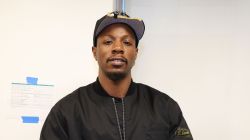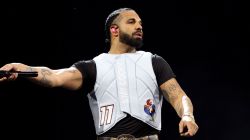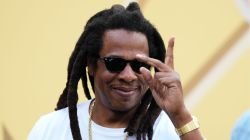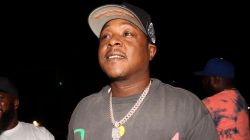Just like his lyrics in verses, Ras Kass has always been brutally honest in interviews. The California lyricist may find himself on an endangered species list within the confines of 2010’s Hip Hop status quo, but earlier this year, fans showed their dedication, with pledges of support for the emcee’s latest project, A.D.I.D.A.S., a 2CD with songs produced by Alchemist, Mr. Porter and early collaborator DJ Rhettmatic.
Without a label in place, Ras Kass’ formula proved to be successful for him, and just as the HRSMN member played martyr for label-locked emcees in the early ’00s, now he hands them a blueprint on how to exist once liberated. The esteemed veteran was in good spirits to speak to HipHopDX this month, and discuss how his love of the art has returned through this new structure, as well as working with production icon David Axelrod, and running around New York in the early ’90s with a fellow lyricist, Big L.
HipHopDX: Where you surprised on how quickly people put it down for A.D.I.D.A.S.?
Ras Kass: Yeah, definitely. At the end of the day, I always look at it as…a lot of people have had a consistent career, and just because of some things personal, some things business, my career was stalled and stopped. It’s Hip Hop. If you’re gone for a year, mothafuckas will forget, like “whatever!” So with me havin’ so many stops and false starts and shit, I was really apprehensive with the pre-order. The project was going to come out digitally, no matter what, but some of my base-fans were like, “Why don’t you make a CD?” [I would respond], “Dude, the cost of making the CD, I don’t want to have to eat that cost.” So the fact that they activated [the pledge that fast impressed me]. As an artist havin’ an ego, I don’t really want to put that much power in people’s hands, ’cause what if it don’t happen? Then I’d just feel like a sucker. Nah, they activated it really fast. That definitely helped us to even improve on the project more. It helped us start showin’ a new model. Anybody out here that’s not Madonna or Lady Gaga or Drake, you’re looking for a new model. We’ve developed a way. I think Tech N9ne has shown people. He has a different model [than me]. We’re in the infant stages of doin’ what we’re doin’, but it works for us. I think this model, in general, can work for most artists. We blaze our own trail – on the music side, but on the business side [too]. At least we [now] know that we have enough people to put their money where my mouth is. [Laughs] We paid it forward.
DX: Has this process of going back to direct-to-fan relationships and vinyl and things made it fun for you again, especially having been in this game for 20 years?
Ras Kass: Yeah man. Is it 20? Damn, man. Well, close to – 14, 15 [years], yeah. Let’s not remember that. [Laughs] It really has, to be perfectly honest. Every human being naturally wants to control their destiny. For a long time, I just felt like I was a salmon, swimmin’ upstream, fighting against the current. Now we’re doin’ what we want to do. With this album – well, it’s not an album, I call everything a project – with this project, whatever it develops into, I’m sure people will be more than pleasantly surprised, just by the packaging. We could do what we wanted to do. We said, “We can cut the corners and be cheap, but what fuck that, nigga. Let’s do the shit and make it fly. What would you want to see?” Me, as a fan, it got me energized in that sense. Like for the vinyl, [we made a gold vinyl 12″]. It’s empowered all of us, it’s allowed us to be creative.
DX: Back in the ’70s, artists had mainstream albums and they had smaller budget albums, but they were all albums. When you distinguish between a “project” and an “album,” don’t you think you’re short-changing some of the quality that lives on something like an Institutionalized?
Ras Kass: The reason I say it is because I live in an environment where – to use an analogy – when I walk down the street, I see an Asian, a Caucasian, a Mexican, a Jew, a light-skinned nigga, a Mexican, a Negro…if we were in a better place as a society, I could probably just say I see people. The world has created the categories, I didn’t create [them]. The problem with Hip Hop is that a mixtape, nobody cares about. Everybody has a mixtape – my 11 year-old nephew got a mixtape, and he has the ability to put artwork on it. If I say I’m doing a mixtape, nobody gives a fuck – [unless if DJ] Green Lantern, Don Cannon [or DJ] Drama did it. It’s a semantics game, and the world has already accepted these definitions, and they operate consciously on them. It’s clowny, it’s corny, but I didn’t make the rules. The flip-side is, if I come up with an album, and everybody’s lookin’ for an imprint – “Who’d you sign to?” If it’s not signed to somebody, it still doesn’t mean anything. I still can’t get in the magazine or that magazine’s [website] because it’s not a major label album release so, “We don’t care.” By definition, it’s an album. Because it didn’t sell and it’s not in the Top 100, it was a flop and it was wack. I didn’t make these rules and I damn sure didn’t make Rap or Hip Hop that corny. I just have to live by the rules of it. It hurts my heart that that’s how corny Rap niggas is. If it didn’t sell, it ain’t good. MC Hammer and Vanilla Ice sold 10 million, and back then you could still say, “That shit’s kind of wack.” Now, the same the shit we swore we wouldn’t be, we are. I say “we” collectively as Hip Hop. Same shit. “If I sold, I’m hot.” Nah, you’re still trash. You’re just popular trash.
DX: You worked with DJ Rhettmatic early in your career, and he was instrumental in A.D.I.D.A.S., you’ve got a “Van Gogh 2” record on this project. Can you speak about the cyclical nature of this point in your career?
Ras Kass: It’s called A.D.I.D.A.S. It’s retro in the way I envisioned it, like you said, cyclical – old characters pop up. It’s also kind of futuristic. I’ve actually got two songs produced by a group called The Futuristics. It was my evolution. Symbolically, this project may have taken me from ’96 to 2016. Maybe that’s what it is. A lot of artists that have had a consistently linear career, you get to see them grow in stages. If you listen to Outkast‘s [Southernplayalisticadillacmuzik to ATLiens to Aquemini], you see them grow. With me. With [Talib] Kweli. With Common. Drake was wearin’ football pads [on Degrassi]. You see him grow year by year, not suddenly. I say that in a good way. With endangered lyricists – and I’m not the only one, because of company shit, the business of music, you don’t get to see that linear music. I put out music [and still, people ask me], “When are you gonna put something out?” Bro, I’ve been doin’ shit, but just ’cause it wasn’t on a major label and you didn’t get to see it with an ad in a magazine, you didn’t really get to see my growth and my evolution. Maybe that’s what this was for me – a return to the roots, just so you could see all the growth since then.
DX: Last year, Snoop Dogg became Creative Chairman at Priority Records. He re-released three albums from EPMD, Eazy E and Master P. A lot of our readers commented that he should re-release some other stuff from the label. Soul On Ice was brought up a lot. I’m curious to know if Snoop has mentioned anything to you about the prospects of doing that, and given your relationship with the Priority name, what your thoughts on that would be?
Ras Kass: Nah. Me and Snoop [Dogg] had talked prior – I think it wa prior – to him actually taking the position. We didn’t talk about Soul On Ice. We didn’t talk about one of [my old] records. We talked about a [new] record he said he was interested in doing a verse on. Didn’t happen, but that was cool. We had the dialogue, but he was real busy, so it didn’t turn out. We haven’t spoken about it.
Me, personally, it doesn’t matter to me either way. They own my image and my likeness. They control that. They can do whatever they wish to do. There’s going to be some degree of business, of what I’m going to get out of that. It’s the past, man. I have some other doings that I want to say that are important. My goal is to get my awareness up so I can say these new things. [Laughs] If they put it out, I wouldn’t be hatin’ on it. [The same goes for Rasassination, Van Gogh and Goldyn Child]. That’s the past, and I can’t live in the past. From a collector’s standpoint, that’s dope. I know, I bought [Soul On Ice recently], it cost me a $100. But now I can look at it, and see this lil’ nigga. That [cover] was Brian “B+” Cross‘ vison. That was his vision for the artwork. I was a kid. I wish I in a position where I could say, “Here, let me re-release it.” Now it’s up to EMI [Records] and Capitol [worked into] Priority. Trust me, if I go sell two million records tomorrow, all that shit will be [back] out. “The Real Ras Kass.” All that shit. [Laughs] My job is to work hard today, so that they can exploit my past.
DX: You mention B+. He and I were talking recently about David Axelrod. In 2005, I interviewed the Axe, and we were talking about “The Little Children,” which you worked on from his self-titled album. He spoke highly of that experience, and your talents. With Diamond D’s “Soul On Ice” remix being an Axelrod sample – one of your most celebrated songs, what did that experience mean for you?
Ras Kass: Ironically, I think I was still a Priority artist when I did “The Little Children.” I think maybe half of [the label] had been bought [by Capitol]. I’m sayin’ that to say that Priority was still in a different building. We were in the CNN Building. I had never ever recorded in the Capitol Building. That in of itself was completely surreal. There’s diamond plaques from The Beatles and Hammer, and there’s a lot of history there. To actually be involved with a legend…it ain’t no groupie shit, but for me, meeting and working with [DJ Premier in D&D Studios] was history. The same thing with [Dr.] Dre. This is an older era. With [David] Axelrod, Dre and Premo been samplin’ this nigga! He’s a cool-ass Jazz dude. It was surreal, with a choir. Ain’t no keyboard, there’s 50 children singin’, and he’s writin’ and directin’. It was amazing. The fact that he deemed me worthy artistically…obviously, there were a lot more hotter rappers [sic], people that were more popular than me. It was an honor and a blessing. I can genuinely say, with all the pressure, I genuinely rose to the occasion. I got in there and gunned it. Doc and Premo could tell you the same thing. There were big cameras, big-ass CNN cameras and shit.
DX: That stuff has never surfaced, I believe.
Ras Kass: No. No. It was just amazing. A full-piece orchestra, a full-piece children’s choir, David Axelrod – and me. What the fuck. [Laughs] In the big studio in Capitol. I was just so happy that he felt I captured the essence of what he was tryin’ to say. That meant a lot to me.
DX: You’re a lyrical icon. What verse of yours are the proudest of?
Ras Kass: Oh man. That, is a hard question. That would be a multi-part [answer], ’cause there’s just certain lines that I’ve said that sums up exactly how I felt. It wouldn’t be what people would think it was. It’s not “Nature of the Threat” or “Interview With a Vampire.” There’s just little sings I’ve said that explain everything I’ve ever felt. Some of it would definitely be on Soul On Ice. It would be bars from a lot of different songs.
I’m really proud of “Right Where I Left Off.” The bounce on that record, and the stories I’m tellin’ while using homonyms is sick. I’m very proud of that record. If a more popular rapper had done that on a major label, then people would go shit bricks. The flow’s sick. Socio-political shit I’ve said, certain shit I’ve said about my family on records that people may or may not have heard [impresses me]. I always think that “Behind The Music” is a brilliant record. I’m not an angry rapper. My goal is to give people a message with some cynicism and some comedy.
DX: I can say this about your HRSMN brothers, but I like my emcees arrogant. I love Melle Mel for that, I love Lord Finesse for that, Big Daddy Kane. If my era’s emcees, the mid-’90s emcee, I can never decide who had a bigger chip on their shoulder, you or Big L. Your careers have a lot of parrallels in the critical response versus commercial. I’m not going to pose that question to you, but rather, I’m curious to know if you guys crossed paths, and what that relatationship was like.
Ras Kass: Yeah! For the 100th issue of The Source, there’s this picture of me and [Big] L. I don’t where we were at. It was Boot Camp Clik and Kid Capri that heard my demo tape. Kid Capri flew me out long before Priority signed me. I flew out and I stayed for like three weeks. In that process, I ended up meeting [Fat] Joe and meeting the whole Diggin’ In The Crates, and of course, L. O.C. was always like my big bro, and L was – I hate putting words in people’s mouth after they pass, but I always felt like we liked each other and we were super cool. I was younger than him, but I was kind of like a lil’ bro to him, and he’d fuck with me. I can remember goin’ out in Harlem to a grimy-ass gambling spot that apparently Big L was runnin’. There was a club in the front and gamblin’ in the back. I’m this lil’ west coast nigga – got my chain on, this, that and the third. In the back of my mind I’m thinkin’, “What if I get set-up? But niggas seem like real niggas and I’ma go see what it do.” Big L always made sure I was good. We had rapper debates. I fucked with L. I hung with L probably three times where it was really just us out somewhere, at some shit – drinkin’ Hennessy and gettin’ at bitches. I have some great Hip Hop memories. He was a good dude, always 100 with me.
L wasn’t there when [Tha Dogg Pound] were shootin’ the “New York, New York” video, but that’s another memory. We were all in the studio. It was me, Diamond [D], O.C., Joe, and then me. I’m the only west coast nigga, kind of defendin’ “New York, New York.” I got some good memories! I wouldn’t say me and L was best friends or nothin’ like that – sometimes when people pass, people put a tint on it. “You was my best friend!” But we had a good rapport and we definitely hung, and I certainly was a fan.
DX: Even down to Kid Capri and Boot Camp, you just said something that Wikipedia and AllMusicGuide doesn’t even have on you, and I never even knew…
Ras Kass: Well, Wikipedia is about 80% true [about me]. I read that I cut my finger off ’cause I was an angry young man. [Laughs] Yeah, I got a couple of big bro’s in this shit that I think genuinely give a fuck about me. It all started with Rap.











Meet a Rich Match on
Yachtcupid(CO /M)
The best club for
seek ing the rich singles, sexy beauties. …what’s the most important is that you don’t have to be a millionaire, but you can meet one. …;-)
Good interview, really compelling read.
this guy can really write. just want him, to do another choon, with CHINO XL, after “RIIOT”.
Chino XL is on ADIDAS… check the track Scenario 2012 on raskass.bandcamp.com
Chino XL is on ADIDAS… check the track Scenario 2012 on raskass.bandcamp.com
A.D.I.D.A.S. is the truth, and so is ras. i’ve been listening since soul on ice, and his new shit is classic.
copy that
just read the interview. reading a RAZZY inteview’s alwayz classic. and i agree….”RIGHT WHERE I LEFT OFF” is genius.
I still miss Big L .. I would so much liked to see dude blow the fuck up and live to see it.
Its a damn shame he got bodied.
Rass Kass is a great mc with talent I hope this time around he keeps his head right
Maybe late but i just checked A.D.I.D.A.S. Rass is killin it and I love it
Ras is the real deal GREAT interview from a even MORE GREAT LYRICISTS I hope Snoop does re-release SOUL ON ICE
ill ass interview. i wanna hear/buy ADIDAS
I honestly wish the most success to rass kass. Talk about a dude that’s been working his way up. And he’s on top of his game, he’s never been better. HRSNMN is gonna fuck the world up son! lol
HRSMN* lol
EXCLUSIVE new track:
SLIM THUG FEAT. KANYE WEST & BUN B – IN THE STREETS
[ http://www.mediafire.com/?5wq6c4bi4t2o9vv ]
knot interview right here,good job dx yell
http://www.myspace.com/panhandoelrcorp
http://www.patuniverse.blogspot.com
No wonder he’s broke. He’s paying $100.00 for his own album when it’s $7.99 on Itunes? Lay off the crack.
And for the sake of debate, even though MC Hammer and Vanilla Ice are considered idiots now, back in the day, they sold shitloads. It may not have been pure talent, but they knew how to market themselves. Selling 10 million albums doesn’t make you wack. If anything, it means they were onto something, but went for the fast money and crashed out.
You mean to tell me his 11 year old nephew can make a label for a bootleg CD, yet Ras can’t generate better beats after a decade of being in the game? Good intentions don’t cement your legacy. I’m sure he’s made a few bucks. Call it a day.
Vanilla was commercial success because he was a white rapper. Hammer had success because he was a talented entertainer. Ras’ lack of success was based on weak production, and now it’s based on weak production and goofy ass concepts.
Ras Kass has become an idiotic clownish rapper, ever since rasassination. He’s in need of a rasurrection. After releasing nature of the threat, Ras must’ve woke up with a horse head in his bed.
DOPE MIXTAPE!!!!!!!!!!!!!!!!!!!!!
BLOCKBUSTERS VOL 1
Here is the link:
http://www.mediafire.com/?mbja8044w3a55p2
Track list
1)Diplomats-Salute
2)Cam’ron&Vado-Speakin Tongues
3)Vado-Polo
4)Jadakiss&Nicki Minaj-I think she likes me
5)Drake&Lil Wayne-Miss Me
6)Busta Rhymes-Stop the Party(remix)
7)T.I.-Yeah Ya Know
8)Young Jeezy&Drake-Lose my Mind(remix)
9)Rick Ross-Mc Hammer
10)Rick Ross&Styles P-B.M.F
11)Yung Joc-Yea Boy
12)Shawty Lo&Gucci Mane-Brids(remix)
13)Yo Gotti&Young Jeezy-White(Dax Cocaine Mix)
14)Waka Flocka Flame-Hard in the Paint
OR DATPIFF.COM
The majority of his music since he’s been home, starting from Institutionalized all the way to the Quarterly joint he just released earlier this year, the bars and the music are in sync. He is like a new MC again with renewed vigot.
i bought a copy of “soul on ice” several years ago for $50
already got my digital copy and awaiting the physical of Adidas-always backed Ras and wrote him notes when he was in the pen.
Ras is the kinda nigga that might blow up (again) even when he is like 54
His lyrical power is hard to match these days
Wanna find AN I-NTERRACIAL R-ELATION-SHIP???
Here is a very nice co-mmunity
_____ b l a c k w h i t e m i n g l e * c o m ____
It’s where black white sing-les looking for someone to enjoy their lifestyle with.
Come in and stay a while. Complete your profile. Post a message, a picture of yourself and check out the photo galleries.
Give it a try, you will find someone you like here… 😉 “““
Wonder who Eminem is talking about on Recovery? Visit my page and listen to “!” to find out!!
http://www.myspace.com/ibaronline
Wonder who Eminem is talking about on Recovery? Visit my page and listen to “!” to find out!!
http://www.myspace.com/ibaronline
Wonder who Eminem is talking about on Recovery? Visit my page and listen to “!” to find out!!
http://www.myspace.com/ibaronline
Wonder who Eminem is talking about on Recovery? Visit my page and listen to “!” to find out!!
http://www.myspace.com/ibaronline
Wonder who Eminem is talking about on Recovery? Visit my page and listen to “!” to find out!!
http://www.myspace.com/ibaronline
Wonder who Eminem is talking about on Recovery? Visit my page and listen to “!” to find out!!
http://www.myspace.com/ibaronline
Wonder who Eminem is talking about on Recovery? Visit my page and listen to “!” to find out!!
http://www.myspace.com/ibaronline
Wonder who Eminem is talking about on Recovery? Visit my page and listen to “!” to find out!!
http://www.myspace.com/ibaronline
Wonder who Eminem is talking about on Recovery? Visit my page and listen to “!” to find out!!
http://www.myspace.com/ibaronline
Wonder who Eminem is talking about on Recovery? Visit my page and listen to “!” to find out!!
http://www.myspace.com/ibaronline
Wonder who Eminem is talking about on Recovery? Visit my page and listen to “!” to find out!!
http://www.myspace.com/ibaronline
Wonder who Eminem is talking about on Recovery? Visit my page and listen to “!” to find out!!
http://www.myspace.com/ibaronline
Wonder who Eminem is talking about on Recovery? Visit my page and listen to “!” to find out!!
http://www.myspace.com/ibaronline
Wonder who Eminem is talking about on Recovery? Visit my page and listen to “!” to find out!!
http://www.myspace.com/ibaronline
Wonder who Eminem is talking about on Recovery? Visit my page and listen to “!” to find out!!
http://www.myspace.com/ibaronline
Wonder who Eminem is talking about on Recovery? Visit my page and listen to “!” to find out!!
http://www.myspace.com/ibaronline
Wonder who Eminem is talking about on Recovery? Visit my page and listen to “!” to find out!!
http://www.myspace.com/ibaronline
Wonder who Eminem is talking about on Recovery? Visit my page and listen to “!” to find out!!
http://www.myspace.com/ibaronline
Wonder who Eminem is talking about on Recovery? Visit my page and listen to “!” to find out!!
http://www.myspace.com/ibaronline
Wonder who Eminem is talking about on Recovery? Visit my page and listen to “!” to find out!!
http://www.myspace.com/ibaronline
Wonder who Eminem is talking about on Recovery? Visit my page and listen to “!” to find out!!
http://www.myspace.com/ibaronline
Wonder who Eminem is talking about on Recovery? Visit my page and listen to “!” to find out!!
http://www.myspace.com/ibaronline
Wonder who Eminem is talking about on Recovery? Visit my page and listen to “!” to find out!!
http://www.myspace.com/ibaronline
Wonder who Eminem is talking about on Recovery? Visit my page and listen to “!” to find out!!
http://www.myspace.com/ibaronline
Wonder who Eminem is talking about on Recovery? Visit my page and listen to “!” to find out!!
http://www.myspace.com/ibaronline
Wonder who Eminem is talking about on Recovery? Visit my page and listen to “!” to find out!!
http://www.myspace.com/ibaronline
Wonder who Eminem is talking about on Recovery? Visit my page and listen to “!” to find out!!
http://www.myspace.com/ibaronline
Wonder who Eminem is talking about on Recovery? Visit my page and listen to “!” to find out!!
http://www.myspace.com/ibaronline
Wonder who Eminem is talking about on Recovery? Visit my page and listen to “!” to find out!!
http://www.myspace.com/ibaronline
Wonder who Eminem is talking about on Recovery? Visit my page and listen to “!” to find out!!
http://www.myspace.com/ibaronline
Wonder who Eminem is talking about on Recovery? Visit my page and listen to “!” to find out!!
http://www.myspace.com/ibaronline
Wonder who Eminem is talking about on Recovery? Visit my page and listen to “!” to find out!!
http://www.myspace.com/ibaronline
Wonder who Eminem is talking about on Recovery? Visit my page and listen to “!” to find out!!
http://www.myspace.com/ibaronline
Wonder who Eminem is talking about on Recovery? Visit my page and listen to “!” to find out!!
http://www.myspace.com/ibaronline
Wonder who Eminem is talking about on Recovery? Visit my page and listen to “!” to find out!!
http://www.myspace.com/ibaronline
Wonder who Eminem is talking about on Recovery? Visit my page and listen to “!” to find out!!
http://www.myspace.com/ibaronline
Wonder who Eminem is talking about on Recovery? Visit my page and listen to “!” to find out!!
http://www.myspace.com/ibaronline
Wonder who Eminem is talking about on Recovery? Visit my page and listen to “!” to find out!!
http://www.myspace.com/ibaronline
Wonder who Eminem is talking about on Recovery? Visit my page and listen to “!” to find out!!
http://www.myspace.com/ibaronline
Wonder who Eminem is talking about on Recovery? Visit my page and listen to “!” to find out!!
http://www.myspace.com/ibaronline
Wonder who Eminem is talking about on Recovery? Visit my page and listen to “!” to find out!!
http://www.myspace.com/ibaronline
Wonder who Eminem is talking about on Recovery? Visit my page and listen to “!” to find out!!
http://www.myspace.com/ibaronline
Wonder who Eminem is talking about on Recovery? Visit my page and listen to “!” to find out!!
http://www.myspace.com/ibaronline
Wonder who Eminem is talking about on Recovery? Visit my page and listen to “!” to find out!!
http://www.myspace.com/ibaronline
Wonder who Eminem is talking about on Recovery? Visit my page and listen to “!” to find out!!
http://www.myspace.com/ibaronline
Wonder who Eminem is talking about on Recovery? Visit my page and listen to “!” to find out!!
http://www.myspace.com/ibaronline
Wonder who Eminem is talking about on Recovery? Visit my page and listen to “!” to find out!!
http://www.myspace.com/ibaronline
Wonder who Eminem is talking about on Recovery? Visit my page and listen to “!” to find out!!
http://www.myspace.com/ibaronline
Wonder who Eminem is talking about on Recovery? Visit my page and listen to “!” to find out!!
http://www.myspace.com/ibaronline
Wonder who Eminem is talking about on Recovery? Visit my page and listen to “!” to find out!!
http://www.myspace.com/ibaronline
Wonder who Eminem is talking about on Recovery? Visit my page and listen to “!” to find out!!
http://www.myspace.com/ibaronline
Wonder who Eminem is talking about on Recovery? Visit my page and listen to “!” to find out!!
http://www.myspace.com/ibaronline
Wonder who Eminem is talking about on Recovery? Visit my page and listen to “!” to find out!!
http://www.myspace.com/ibaronline
Wonder who Eminem is talking about on Recovery? Visit my page and listen to “!” to find out!!
http://www.myspace.com/ibaronline
Wonder who Eminem is talking about on Recovery? Visit my page and listen to “!” to find out!!
http://www.myspace.com/ibaronline
Wonder who Eminem is talking about on Recovery? Visit my page and listen to “!” to find out!!
http://www.myspace.com/ibaronline
Wonder who Eminem is talking about on Recovery? Visit my page and listen to “!” to find out!!
http://www.myspace.com/ibaronline
Wonder who Eminem is talking about on Recovery? Visit my page and listen to “!” to find out!!
http://www.myspace.com/ibaronline
Wonder who Eminem is talking about on Recovery? Visit my page and listen to “!” to find out!!
http://www.myspace.com/ibaronline
Wonder who Eminem is talking about on Recovery? Visit my page and listen to “!” to find out!!
http://www.myspace.com/ibaronline
Wonder who Eminem is talking about on Recovery? Visit my page and listen to “!” to find out!!
http://www.myspace.com/ibaronline
Wonder who Eminem is talking about on Recovery? Visit my page and listen to “!” to find out!!
http://www.myspace.com/ibaronline
Wonder who Eminem is talking about on Recovery? Visit my page and listen to “!” to find out!!
http://www.myspace.com/ibaronline
Wonder who Eminem is talking about on Recovery? Visit my page and listen to “!” to find out!!
http://www.myspace.com/ibaronline
Wonder who Eminem is talking about on Recovery? Visit my page and listen to “!” to find out!!
http://www.myspace.com/ibaronline
Wonder who Eminem is talking about on Recovery? Visit my page and listen to “!” to find out!!
http://www.myspace.com/ibaronline
Wonder who Eminem is talking about on Recovery? Visit my page and listen to “!” to find out!!
http://www.myspace.com/ibaronline
Wonder who Eminem is talking about on Recovery? Visit my page and listen to “!” to find out!!
http://www.myspace.com/ibaronline
Wonder who Eminem is talking about on Recovery? Visit my page and listen to “!” to find out!!
http://www.myspace.com/ibaronline
Wonder who Eminem is talking about on Recovery? Visit my page and listen to “!” to find out!!
http://www.myspace.com/ibaronline
Wonder who Eminem is talking about on Recovery? Visit my page and listen to “!” to find out!!
http://www.myspace.com/ibaronline
Wonder who Eminem is talking about on Recovery? Visit my page and listen to “!” to find out!!
http://www.myspace.com/ibaronline
Wonder who Eminem is talking about on Recovery? Visit my page and listen to “!” to find out!!
http://www.myspace.com/ibaronline
Wonder who Eminem is talking about on Recovery? Visit my page and listen to “!” to find out!!
http://www.myspace.com/ibaronline
Wonder who Eminem is talking about on Recovery? Visit my page and listen to “!” to find out!!
http://www.myspace.com/ibaronline
Wonder who Eminem is talking about on Recovery? Visit my page and listen to “!” to find out!!
http://www.myspace.com/ibaronline
Wonder who Eminem is talking about on Recovery? Visit my page and listen to “!” to find out!!
http://www.myspace.com/ibaronline
Wonder who Eminem is talking about on Recovery? Visit my page and listen to “!” to find out!!
http://www.myspace.com/ibaronline
Wonder who Eminem is talking about on Recovery? Visit my page and listen to “!” to find out!!
http://www.myspace.com/ibaronline
Wonder who Eminem is talking about on Recovery? Visit my page and listen to “!” to find out!!
http://www.myspace.com/ibaronline
Wonder who Eminem is talking about on Recovery? Visit my page and listen to “!” to find out!!
http://www.myspace.com/ibaronline
Wonder who Eminem is talking about on Recovery? Visit my page and listen to “!” to find out!!
http://www.myspace.com/ibaronline
Wonder who Eminem is talking about on Recovery? Visit my page and listen to “!” to find out!!
http://www.myspace.com/ibaronline
Wonder who Eminem is talking about on Recovery? Visit my page and listen to “!” to find out!!
http://www.myspace.com/ibaronline
Wonder who Eminem is talking about on Recovery? Visit my page and listen to “!” to find out!!
http://www.myspace.com/ibaronline
Wonder who Eminem is talking about on Recovery? Visit my page and listen to “!” to find out!!
http://www.myspace.com/ibaronline
Wonder who Eminem is talking about on Recovery? Visit my page and listen to “!” to find out!!
http://www.myspace.com/ibaronline
Wonder who Eminem is talking about on Recovery? Visit my page and listen to “!” to find out!!
http://www.myspace.com/ibaronline
Wonder who Eminem is talking about on Recovery? Visit my page and listen to “!” to find out!!
http://www.myspace.com/ibaronline
Wonder who Eminem is talking about on Recovery? Visit my page and listen to “!” to find out!!
http://www.myspace.com/ibaronline
Wonder who Eminem is talking about on Recovery? Visit my page and listen to “!” to find out!!
http://www.myspace.com/ibaronline
Wonder who Eminem is talking about on Recovery? Visit my page and listen to “!” to find out!!
http://www.myspace.com/ibaronline
Wonder who Eminem is talking about on Recovery? Visit my page and listen to “!” to find out!!
http://www.myspace.com/ibaronline
Wonder who Eminem is talking about on Recovery? Visit my page and listen to “!” to find out!!
http://www.myspace.com/ibaronline
Wonder who Eminem is talking about on Recovery? Visit my page and listen to “!” to find out!!
http://www.myspace.com/ibaronline
Wonder who Eminem is talking about on Recovery? Visit my page and listen to “!” to find out!!
http://www.myspace.com/ibaronline
Wonder who Eminem is talking about on Recovery? Visit my page and listen to “!” to find out!!
http://www.myspace.com/ibaronline
Wonder who Eminem is talking about on Recovery? Visit my page and listen to “!” to find out!!
http://www.myspace.com/ibaronline
Wonder who Eminem is talking about on Recovery? Visit my page and listen to “!” to find out!!
http://www.myspace.com/ibaronline
Wonder who Eminem is talking about on Recovery? Visit my page and listen to “!” to find out!!
http://www.myspace.com/ibaronline
Wonder who Eminem is talking about on Recovery? Visit my page and listen to “!” to find out!!
http://www.myspace.com/ibaronline
Wonder who Eminem is talking about on Recovery? Visit my page and listen to “!” to find out!!
http://www.myspace.com/ibaronline
Wonder who Eminem is talking about on Recovery? Visit my page and listen to “!” to find out!!
http://www.myspace.com/ibaronline
Wonder who Eminem is talking about on Recovery? Visit my page and listen to “!” to find out!!
http://www.myspace.com/ibaronline
Wonder who Eminem is talking about on Recovery? Visit my page and listen to “!” to find out!!
http://www.myspace.com/ibaronline
Wonder who Eminem is talking about on Recovery? Visit my page and listen to “!” to find out!!
http://www.myspace.com/ibaronline
Wonder who Eminem is talking about on Recovery? Visit my page and listen to “!” to find out!!
http://www.myspace.com/ibaronline
Wonder who Eminem is talking about on Recovery? Visit my page and listen to “!” to find out!!
http://www.myspace.com/ibaronline
Wonder who Eminem is talking about on Recovery? Visit my page and listen to “!” to find out!!
http://www.myspace.com/ibaronline
Wonder who Eminem is talking about on Recovery? Visit my page and listen to “!” to find out!!
http://www.myspace.com/ibaronline
Wonder who Eminem is talking about on Recovery? Visit my page and listen to “!” to find out!!
http://www.myspace.com/ibaronline
Wonder who Eminem is talking about on Recovery? Visit my page and listen to “!” to find out!!
http://www.myspace.com/ibaronline
Wonder who Eminem is talking about on Recovery? Visit my page and listen to “!” to find out!!
http://www.myspace.com/ibaronline
Wonder who Eminem is talking about on Recovery? Visit my page and listen to “!” to find out!!
http://www.myspace.com/ibaronline
Wonder who Eminem is talking about on Recovery? Visit my page and listen to “!” to find out!!
http://www.myspace.com/ibaronline
Wonder who Eminem is talking about on Recovery? Visit my page and listen to “!” to find out!!
http://www.myspace.com/ibaronline
Wonder who Eminem is talking about on Recovery? Visit my page and listen to “!” to find out!!
http://www.myspace.com/ibaronline
Wonder who Eminem is talking about on Recovery? Visit my page and listen to “!” to find out!!
http://www.myspace.com/ibaronline
Wonder who Eminem is talking about on Recovery? Visit my page and listen to “!” to find out!!
http://www.myspace.com/ibaronline
Wonder who Eminem is talking about on Recovery? Visit my page and listen to “!” to find out!!
http://www.myspace.com/ibaronline
Wonder who Eminem is talking about on Recovery? Visit my page and listen to “!” to find out!!
http://www.myspace.com/ibaronline
Wonder who Eminem is talking about on Recovery? Visit my page and listen to “!” to find out!!
http://www.myspace.com/ibaronline
Wonder who Eminem is talking about on Recovery? Visit my page and listen to “!” to find out!!
http://www.myspace.com/ibaronline
Wonder who Eminem is talking about on Recovery? Visit my page and listen to “!” to find out!!
http://www.myspace.com/ibaronline
Wonder who Eminem is talking about on Recovery? Visit my page and listen to “!” to find out!!
http://www.myspace.com/ibaronline
no i don’t wonder…
A place someone who can treat you as a king or who can spoil you like a queen, this is the great place. It’s dedicated for those military singles—Blackmilitaryfriends.com —!!! who are rich and successful to support and pamper military spouses who will treat you like a king and for women military admirers who are attractive and young to seek a generous benefactor to mentor and take care of you.